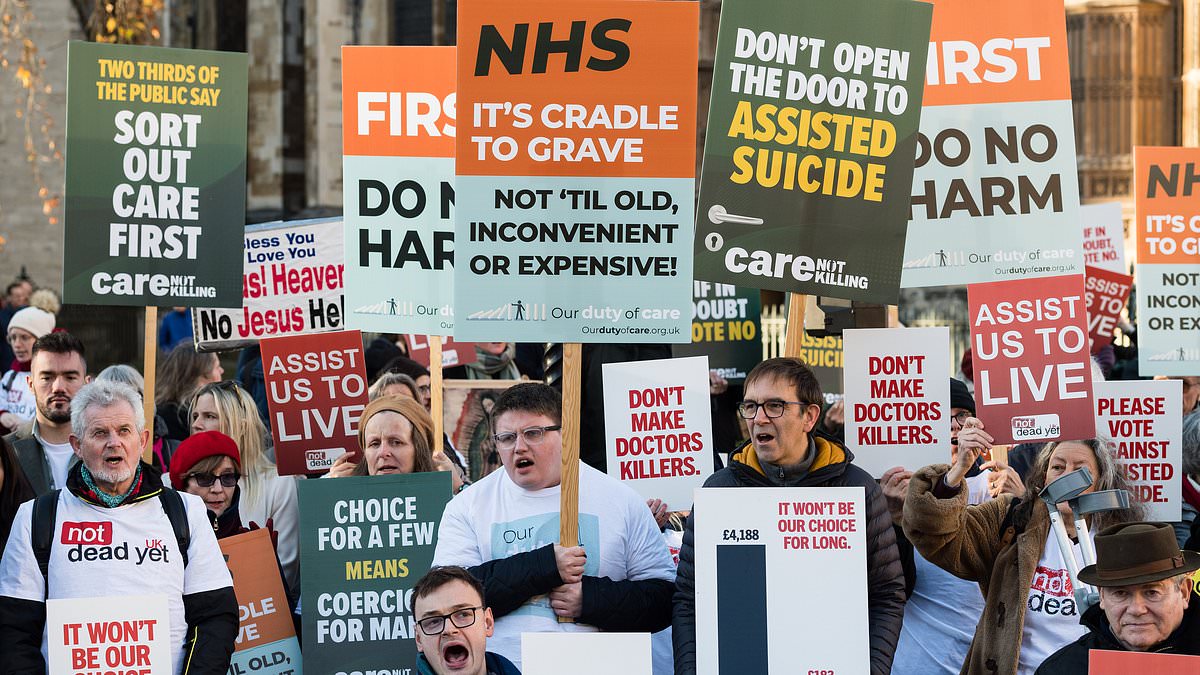More than half of Britons fear vulnerable people could feel pressured to end their life early under assisted dying laws, a new poll has shown.
The YouGov survey, conducted for The Salvation Army, found 56 per cent thought it was likely people would have assisted deaths because they feel a burden to others.
A similar proportion (58 per cent) said, if assisted dying is legalised, then those with disabilities would be at higher risk of being pressured into applying for an assisted death.
Nearly two-thirds (63 per cent) thought there was a higher risk of the elderly being pressured into applying for an assisted death, if Parliament passes laws to allow it.
And 56 per cent said those with mental health issues would be at higher risk of being pressured into making an assisted dying application.
Even among supporters of assisted dying legislation, a majority thought those with a disability (55 per cent), the elderly (60 per cent), and those with mental health issues (53 per cent) would be at higher risk of applying for an assisted death.
It comes ahead of the return of assisted dying legislation to the House of Commons next month, when MPs are set to hold another crunch vote on proposed laws.
The Terminally Ill Adults (End of Life) Bill – being spearheaded by Labour MP Kim Leadbeater – is due to complete its Commons stages on 16 May, following weeks of scrutiny of the legislation by a committee of MPs.
During the Bill’s committee stage, charities reacted with alarm after MPs rejectedan attempt to close a potential loophole that would allow patients with anorexia to access assisted dying.
The committee also rejected an amendment, proposed by ex-home secretary James Cleverly, that sought to strengthen safeguards against people requesting to end their lives because they feel a burden.
The YouGov survey found a majority (55 per cent) of Britons thought assisted dying should not be allowed for those with a mental illness that has affected their physical health, such as anorexia.
It also showed 63 per cent thought assisted dying should not be legal for those whose primary reason is that they feel like a burden on their families or the NHS.
Commissioner Paul Main, territorial leader of The Salvation Army in the UK and Ireland, said: ‘Everyone agrees that people should have relief and dignity in their final days.
‘But this survey shows that the public are concerned that the legislation will not provide that.
‘Even those who support the principle of assisted dying admit that particularly vulnerable groups like those who have a disability and who are elderly are at risk of pressure should the Bill become law.
‘Beneath widespread sympathy lies a deep unease about how such legislation could expose the most vulnerable to harm, coercion, or abandonment.
‘Though this legislation stems from a sincere desire to alleviate suffering, we are urging MPs to vote against the Bill.
‘We are gravely concerned that the Bill invertedly creates a two-tier system of death.
‘It is terrifying to face terminal illness without palliative care but if you cannot access the support that can help alleviate suffering, you may feel you have no choice but to ask for an assisted suicide.’
Tory MP Andrew Rosindell, an opponent of the Bill, said: ‘The grim reality of the Leadbeater Bill is that significant numbers of vulnerable people will opt for an assisted death because they feel like a burden.
‘Wherever these laws have been introduced this has been the case. It’s not surprising the majority of the public are opposed to people opting for an assisted death because they feel like a burden.
‘The moment the public are presented with the reality of Leadbeater’s Bill the majority shun it.’
Fellow Conservative MP Greg Smith said: ‘When you ask the public about the reality of Leadbeater’s Bill and what it’s likely to mean for vulnerable people the majority view is clear.
‘The majority of the public do not believe that this Bill safeguards vulnerable people.’
In a letter to MPs earlier this month, Ms Leadbeater said the Bill’s committee stage had ‘significantly strengthened what was already the most robust assisted dying legislation in the world’.
In an historic vote in November, the Commons voted in favour of the Bill at its second reading and sent it for line-by-line scrutiny by the committee of MPs.
But Ms Leadbeater subsequently sparked anger when she made a major change to the Bill from when it was first introduced to Parliament.
It had initially been said assisted dying applications would only be allowed with the approval of two doctors and a High Court judge.
But Ms Leadbeater later proposed scrapping the High Court oversight in favour of an assisted dying commissioner and expert panels.
Under her new plans, the panels will feature a senior legal figure, a psychiatrist and a social worker who will decide on assisted dying applications.
YouGov surveyed 2,003 adults online between 14 to 15 April.
